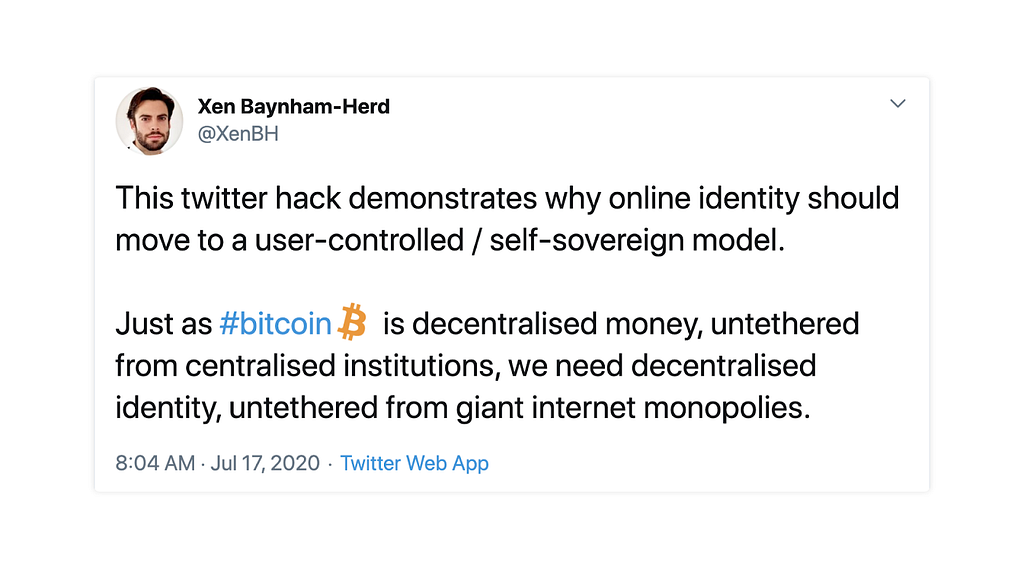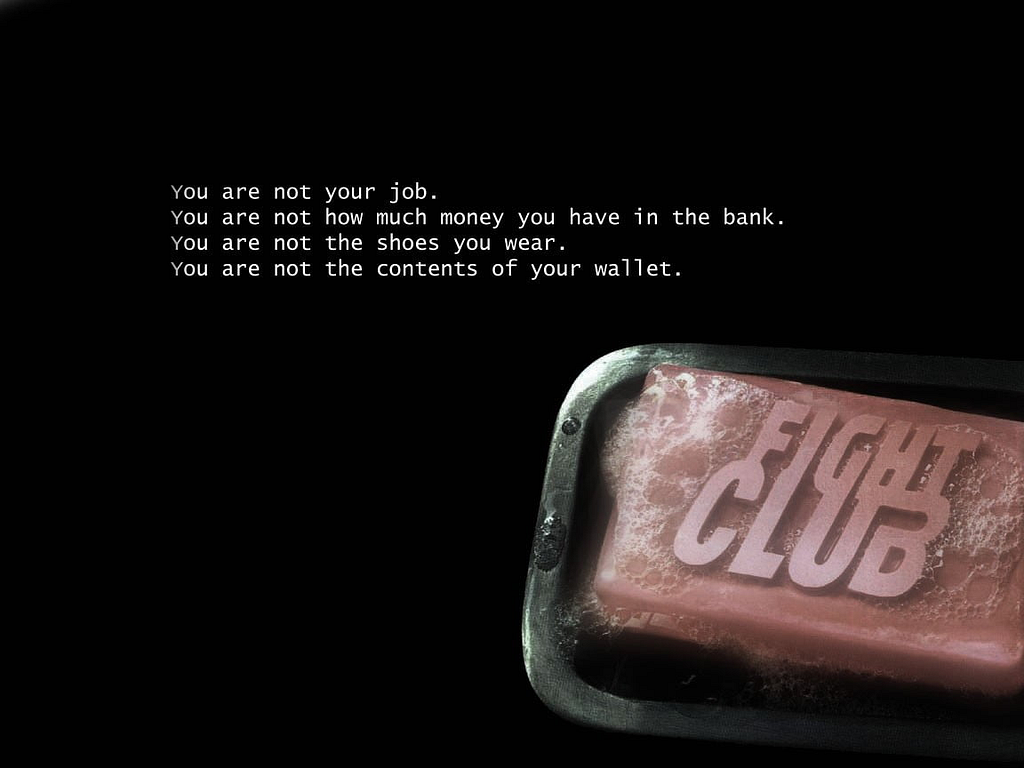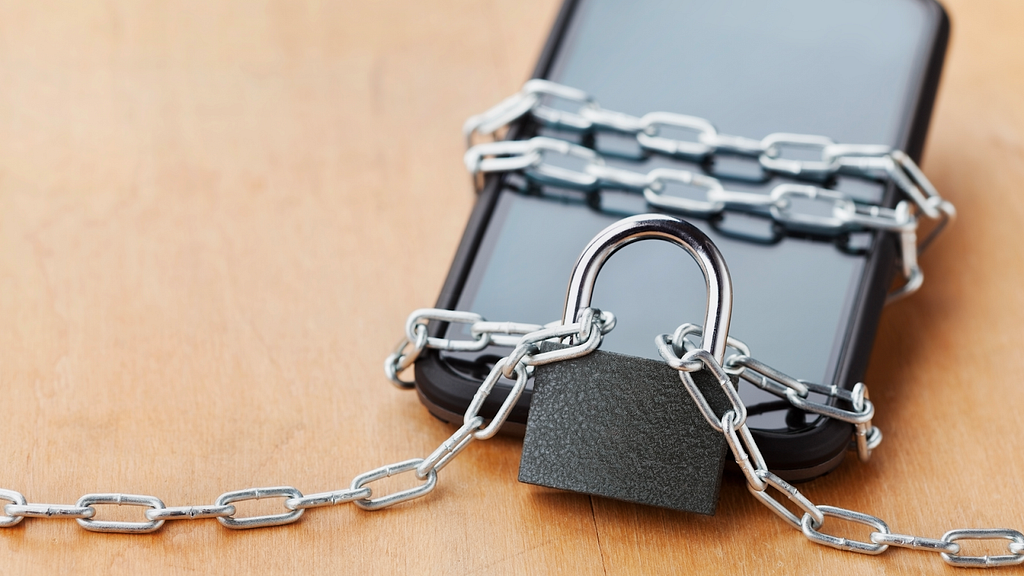Free your money, free your identity

Can the technology that gave us bitcoin also free us from the control of internet giants?
This month, a sophisticated Twitter hack targeted and compromised the accounts of many high profile public figures such as Barack Obama, Bill Gates, and Elon Musk, using the opportunity to solicit people to deposit money into the scammers’ bitcoin addresses.
Twitter’s reputation suffered the most consequential impact, as people lost confidence in their security protocols, privacy controls, and ability to regain control over their platform. One aspect we found particularly noteworthy was the hackers’ motivations behind the attack. They infiltrated Twitter, turned on ‘god mode,’ providing unlimited access to highly influential accounts, and chose to wield this power to execute a common and unprofitable small-scale scam. And for what? Money, reputation, or maybe to obtain privileged information from the 130 accounts overtaken. We may never know — perhaps this was just a distraction, a red herring that hid what they were actually trying to achieve.
Aside from the spectacle, the incident highlights (yet again) just how vulnerable centralised institutions are to security breaches. Such events help underscore the appeal of moving toward more robust and resilient decentralised platforms, without such distinct central points of failure.
The visualisation below provides a glimpse into the prevalence and scale of data breaches and hacks around the world:

The Twitter hack also illuminates our dependency on centralised internet companies for online identity and voice. You may have millions of Twitter followers, but if Twitter suspends your account, they permanently silence your speech, remove a piece of your identity — you’re ‘de-platformed’. Likewise, you may have thousands of friends on Facebook or Instagram, but if they shut you down, you lose access to your online connections, photos, messages, and even revenue streams. These questions inspired my tweet in response (yes, I’m aware of the irony).

Let me further elaborate on this tweet by first providing some historical context on money:
In economics, there exist two dominant yet contrasting schools of thought regarding money: the ‘commodity theory of money’ and the ‘credit theory of money’.
The ‘commodity theory’ purports that money arose in societies as a natural evolution from the use of bartering for the exchange of goods and services. As the variety of goods and services increased, it became practical to use one specific commodity to serve as money — to act as a medium of exchange, and as a method to both store and measure value. In ~9,000 B.C. cattle became one of the first forms of this type of money, followed eventually by Cowrie Shells in 1,200 B.C. By 500 B.C., gold and other precious metals were minted into coins and became prevalent in the Greek, Persian, Macedonian, and Roman empires. They satisfied both criteria, as a medium of exchange and a store of value, due to their divisibility, durability, and natural scarcity, making them examples of commodity money.
The ‘credit theory’, on the other hand, argues that money has its roots in debt; that long before the invention of gold coins, societies used intricate credit-systems to buy and sell goods. People established credit-money based upon contractual agreements that required the existence of rules and credible enforcement. Think of it as the difference between using a nugget of gold as money (commodity money) and a paper ‘IOU’ representing someone’s debt (credit-money). The crucial difference is that a chunk of gold is a physical ‘thing’, whereas an ‘IOU’ is a social construct with agreed-upon rules and a society that determines its value.
In our modern economy, both commodity money and credit-money exist, but the latter dwarfs the former. The trillions of dollars recorded on the balance sheets of our banks are generally not backed by gold or any other commodity. Still, they exist as claims and promises between individuals, organisations, and states. We built our financial system on credit-money and never looked back. That is, until new types of electronic money began to emerge, eventually leading to the creation of Bitcoin in 2009.
Unlike other forms of electronic money, Bitcoin (among its crypto peers) is unique because there is no concept of ‘credit’ built into the issuance process. There is no counter-party or contractual agreement; there is just a fixed supply of digital tokens (21 million) and a price determined entirely by the free market. This radically innovative concept offers an alternative form of digital money. It’s commodity money — it’s digital gold — it’s money without banks.

Which brings us to a more existential application of crypto — Digital Identity.
Like ‘credit-money’, there is an aspect of your identity that is inseparable from relationships with others, and society in general. But like ‘commodity money’, there is a part of your individuality that exists independent of any specific society: a physical you. When you talk to somebody in the street, that communication and identity sharing is peer-to-peer (there is no Facebook in the middle facilitating that interaction). You may choose to join a social organisation, but if you leave, you do not leave your entire identity behind, too, just the aspects specific to that particular social context. You may get a job, but when that job ends, your identity remains. In the words of Fight Club’s Tyler Durden: “you’re not your job”.

The digital ‘you’ is not free. On the internet, there is no neutral place to roam; there is no public street. Huge centrally controlled social networks and applications keep you bound and restrained. You’re psychologically and digitally chained to platforms like Facebook, Twitter, and Linkedin. On the internet these accounts are you. You are your job. You are your social profile.
Our online identities are held captive, and most people are oblivious. Google is likely the gateway to your email, documents, and browsing past. If you lost access to your Gmail, Facebook, or Twitter accounts, there isn’t much of a virtual ‘you’ left. Your identity on the internet is tied to large centralised monopolies, just as your fiat money exists in the form of a credit-system recorded by private and central banks.

Which brings us back to my original point: Could the same technology, that made the digital commodity money bitcoin, create a similar type of digital commodity identity? Is it conceivable to create a digital identity owned and controlled by the individual, not shackled by platforms like Facebook? Imagine being able to leave Twitter but keep your followers. With this reclaimed identity, you would no longer be beholden to the various applications you use. You could take your identity and social connections with you wherever you go on the internet — just as you can walk around freely in the physical world. This significant change would be a user-controlled, self-sovereign online identity.
Bitcoin offers us freedom of money. Freedom of identity is possible too.
For updates on new articles follow me on Twitter. To get started with bitcoin, set-up a free wallet at blockchain.com.
Free your money, free your identity was originally published in @blockchain on Medium, where people are continuing the conversation by highlighting and responding to this story.


